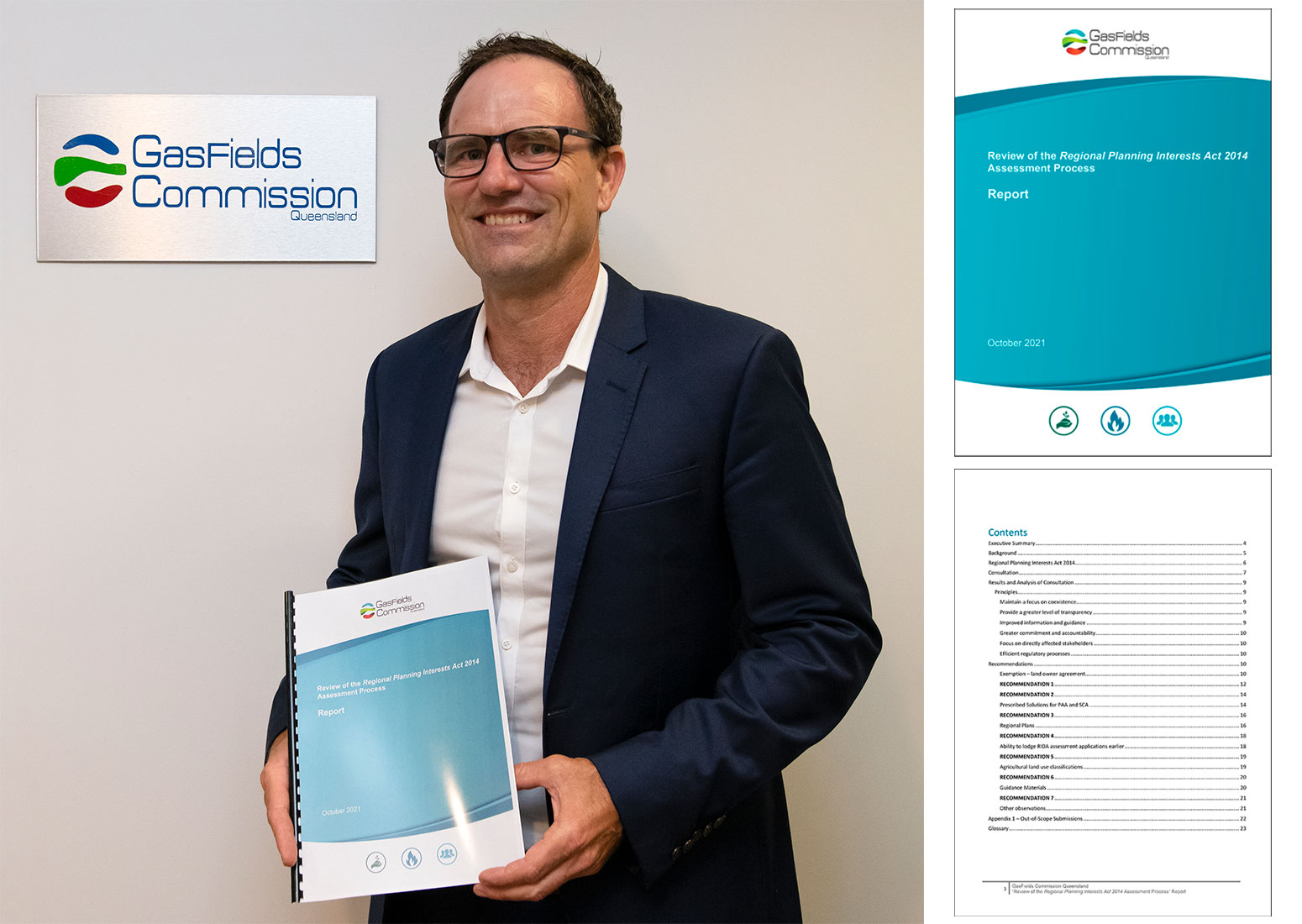GasFields Commission Queensland Recommends Enhancements to RPI Act’s Assessment Processes
The GasFields Commission Queensland (the Commission) has delivered seven recommendations to the State Government as part of its “Review of the Regional Planning Interests Act 2014 Assessment Process Report” (the report) that was released today.
The report comes in response to the Queensland Audit Office’s performance audit report “Managing coal seam gas activities” which recommended the Commission review the Regional Planning Interests Act 2014 (the RPI Act) assessment processes to determine whether the process adequately manages coal seam gas activities in areas of regional interest. The report also responds to concerns raised with the Commission by stakeholders relating to the effectiveness of the RPI Act in protecting agricultural land assets.
The Commission’s Acting CEO Warwick Squire commented, “this is the first time the Commission has undertaken such a comprehensive regulatory review and made recommendations to the State Government as part of its legislative review function.
“The release of these recommendations clearly illustrate the Commission is focused on enhancing the regulatory framework that protects Queensland’s agricultural resources, whilst also helping provide Queensland’s onshore gas industry a higher degree of certainty and accountability when undertaking activities on high-value agricultural land.”
The Commission’s seven recommendations emanated from targeted consultation with key stakeholder groups, including resource and agricultural peak bodies, State and Local Government and individual rural land owners.
The submissions received highlighted how the use of exemptions to the Regional Interests Development Approval (RIDA) process meant it was difficult for stakeholders and government to ascertain the extent and types of activities being undertaken in areas of regional interest.
Submissions also described how the gas industry achieved high levels of innovation that likely met or exceeded requirements when working in areas of regional interest. However, due to the lack of transparency, these practices were not recognised by all stakeholders as appropriately addressing impacts to areas of regional interest.
To address these findings the Commission’s seven recommendations focused on:
- providing greater transparency and accountability of the assessment process through removal of exemptions associated with land owner agreements, to be replaced with a self-assessment process informed by a development code and notification requirements;
- enhanced notification and land owner consultation requirements, focusing on improving transparency of the assessment process and also government oversight and compliance;
- provision of greater guidance on development outcomes in priority agriculture areas (PAAs) and strategic cropping areas (SCAs), informed by the reviewed Statutory Regional Plans;
- a comprehensive review of agricultural land use classifications as they relate to coexistence outcomes; and
- improved guidance and information materials to explain the function and implications of the RPI Act and assessment processes for land owners.
As the Commission’s purpose is to manage and improve sustainable coexistence between landholders, regional communities and Queensland’s onshore gas industry, a balanced approach was adopted when identifying and recommending potential enhancements to the RPI Act’s regulatory framework.
“A common desire among regional communities is an assurance that there are effective regulatory frameworks in place, and they are being implemented appropriately to support the environmental and economic viability of their communities. Having these assurances would build confidence and trust amongst stakeholders and help to support better relationships and develop sustainable coexistence.
“This report is a great example of the Commission playing an important role in helping to provide this ‘community assurance’ by overseeing how government entities are implementing the current regulatory framework and then providing clear recommendations on opportunities for improvement.
“The Commission possesses a unique ability to operate at ‘arm’s length’ from government to facilitate appropriate oversight of the implementation of government regulatory frameworks. We stand committed and ready to utilise our oversight function to manage and improve sustainable coexistence between landholders, regional communities and Queensland’s onshore gas industry for the foreseeable future,” Mr Squire said.
The Commission has presented the report and recommendations to the State Government for consideration. For more information download: “Review of the Regional Planning Interests Act 2014 Assessment Process Report”
For media enquiries
+61 7 3067 9400
enquiries@gfcq.org.au
Who are the GasFields Commission Queensland?
Established as an independent statutory body in 2013, the Commission’s purpose is to manage and improve the sustainable coexistence of landholders, regional communities and the onshore gas industry in Queensland. The Commission manages sustainable coexistence in petroleum and gas producing regions of Queensland, and will continue to do so as the industry expands into new and emerging basins.
Our vision is to achieve thriving communities in areas of gas development that are free from discord and supported by well-informed, respectful and balanced stakeholder relationships.
One way the Commission is endeavouring to realise this vision is by providing transparency and independent assurances that the onshore gas industry is appropriately regulated and held to account when needed. This in turn will help cultivate sustainable coexistence, whilst ensuring community and landholder confidence in the regulators and gas industry increases.
Drawing on its wealth of experience in the development of the gas industry and by collaborating with other relevant entities, the Commission provides a range of support to communities and landholders, primarily through education and engagement. These education and engagement activities occur with individual landholders via Commission facilitated webinars, information sessions, publications (The Gas Guide, Shared Landscapes Reports), face-to-face meetings and public workshops.
It should be noted that the Commission does not engage in individual negotiations between landholders and gas companies, but rather provides communities and landholders with the information and support they need to make informed decisions and achieve good outcomes.
Latest Articles
What are your views on the onshore gas industry and GasFields Commission Queensland?
![]()
Coexistence challenges and opportunities
![]()
Join the conversation to enhance coexistence in Queensland
![]()
Corrigendum to the report: Review of the Regional Planning Interests Act 2014 Assessment Process
![]()
Study builds greater understanding of CSG-induced subsidence impact on farming businesses
![]()

